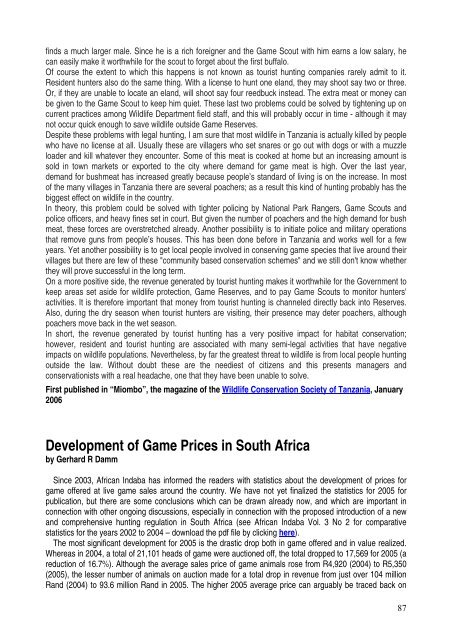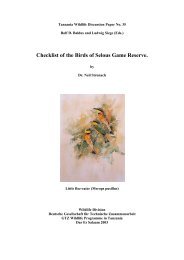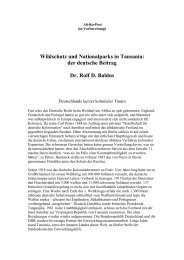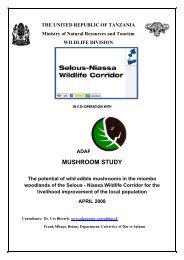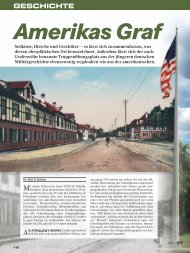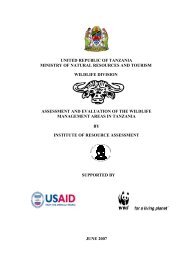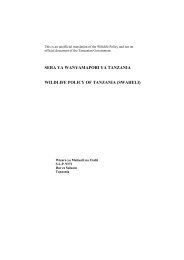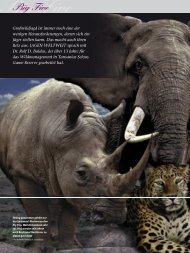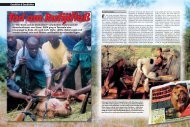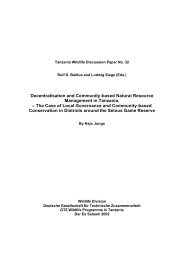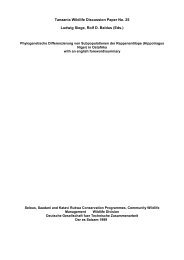Both types of area contained much higher densities of mammals than Game Controlled Areas or Open Areasthat also sanction tourist hunting but that allow settlement and cattle grazing and resident hunting as well.This shows that it is not tourist hunting itself that conserves mammals but it is the absence of people living inGame Reserves and National Parks or perhaps the absence of resident hunters that are the key.We also looked at the health of vegetation in different types of protected area using satellite imagery. Whenwe divided up pixels in Tanzania according to whether they were in National Parks, Game Reserves, ForestReserves, Game Controlled areas or Open Areas, we found that National Parks and Game Reservesshowed increases in greenness during the 1980 and 1990s. Thus Game Reserves set aside for huntingblocks help to keep habitats healthy as do National Parks. Game Controlled Areas and Forest Reserves onthe other hand suffered great habitat degradation perhaps because they were having trees removed fromthem during this period of time. Once again, this research shows that excluding certain activities, such astree cutting or resident hunting, or excluding people from areas is the key to conserving habitats.In short, if tourist hunting is ac<strong>com</strong>panied by laws, which forbid other activities, and if these laws areenforced, as they are in Game Reserves, then legal hunting benefits animal and plant <strong>com</strong>munities. Whenactivities are allowed and when there is no policing, as in Game Controlled Areas due to lack of funds, thentourist hunting does not help conservation.Baldus: This brings me to your earlier point. You say the effects of legal hunting on <strong>wildlife</strong> can virtually bedisregarded as <strong>com</strong>pared to illegal hunting. Can you elaborate on this? And does legal hunting and thefinancial returns from it have any effect on the illegal activities?Caro: Each year animals are killed by people both legally and illegally in Tanzania. Legal hunting is carriedout by residents and tourists who obtain licenses to shoot a small number of animals, as well as in croppingschemes. Illegal hunting is carried out by people who have no permits at all, but also by tourists andresidents who have obtained permits to shoot a few animals but who take more than they are allowed.Let's go through these one by one bearing in mind that there is little information on how many animals arekilled by illegal methods. First, a hunter may kill an animal having acquired licenses. While such hunting islegal, the quotas allocated for legal hunting are based on educated guesswork because we do not haveadequate information on the size of most animal populations in the country.Thus owners of a hunting block may be allocated a quota to shoot too many individual animals – say toomany lions in a given year. In practice, the Wildlife Department usually sets quotas based on what the quotawas last year. In an attempt to help the Wildlife Department <strong>com</strong>e up with more informed quotas, wematched the population sizes of animals counted from aerial surveys with the tourist hunting off-take indifferent parts of the country and found that off-take was usually low - normally less than 10% of thepopulation size – so the Wildlife Department has got it just about right. Nevertheless, certain species such aseland, lion, leopard and antelope such as reedbuck were being killed at overly high rates in some areas.Hunting licenses for residents are allocated by Regional and District Game Officers. They face the sameproblem as their head office in Dar es Salaam they don't know the number of animals in areas under theirjurisdiction. These officials usually set quotas according to what they were last year as well - but no oneknows whether these are biologically correct. Near towns these quotas are on the high side because GameOfficers are "under siege" for licenses from many applicants rather than just one hunting <strong>com</strong>pany. In short,official hunting quotas at the Regional and District levels may not be set at the appropriate level to maintainanimal populations in the long term. This problem could be solved by regular monitoring of <strong>wildlife</strong>populations right across the country. It might be feasible but very expensive.Unfortunately, there is a second problem with legal hunting. This is the problem of stretching the quota.There are many ways that this is done. For example, a hunting <strong>com</strong>pany can call up the Wildlife Departmentand say that they don't have a quota to hunt leopard this year in this area, but they have a client who wouldlove to shoot one, so could head office stretch a point and sell them a license for just one animal? Anotherway this is done is if the hunting <strong>com</strong>pany has a license to shoot a leopard in one of its blocks in the west ofthe country, but it uses that license to shoot a leopard in its eastern block. Yet another way is when aresident asks a Game Officer if he could take two hartebeest instead of one because Christmas is <strong>com</strong>ingup.A third problem with legal hunting is that residents or tourists may take more animals than their quota allows.Consider a tourist hunter who shoots a male buffalo with fair-sized horns but on the last day of his safari,86
finds a much larger male. Since he is a rich foreigner and the Game Scout with him earns a low salary, hecan easily make it worthwhile for the scout to forget about the first buffalo.Of course the extent to which this happens is not known as tourist hunting <strong>com</strong>panies rarely admit to it.Resident hunters also do the same thing. With a license to hunt one eland, they may shoot say two or three.Or, if they are unable to locate an eland, will shoot say four reedbuck instead. The extra meat or money canbe given to the Game Scout to keep him quiet. These last two problems could be solved by tightening up oncurrent practices among Wildlife Department field staff, and this will probably occur in time - although it maynot occur quick enough to save <strong>wildlife</strong> outside Game Reserves.Despite these problems with legal hunting, I am sure that most <strong>wildlife</strong> in Tanzania is actually killed by peoplewho have no license at all. Usually these are villagers who set snares or go out with dogs or with a muzzleloader and kill whatever they encounter. Some of this meat is cooked at home but an increasing amount issold in town markets or exported to the city where demand for game meat is high. Over the last year,demand for bushmeat has increased greatly because people’s standard of living is on the increase. In mostof the many villages in Tanzania there are several poachers; as a result this kind of hunting probably has thebiggest effect on <strong>wildlife</strong> in the country.In theory, this problem could be solved with tighter policing by National Park Rangers, Game Scouts andpolice officers, and heavy fines set in court. But given the number of poachers and the high demand for bushmeat, these forces are overstretched already. Another possibility is to initiate police and military operationsthat remove guns from people’s houses. This has been done before in Tanzania and works well for a fewyears. Yet another possibility is to get local people involved in conserving game species that live around theirvillages but there are few of these "<strong>com</strong>munity based conservation schemes" and we still don't know whetherthey will prove successful in the long term.On a more positive side, the revenue generated by tourist hunting makes it worthwhile for the Government tokeep areas set aside for <strong>wildlife</strong> protection, Game Reserves, and to pay Game Scouts to monitor hunters'activities. It is therefore important that money from tourist hunting is channeled directly back into Reserves.Also, during the dry season when tourist hunters are visiting, their presence may deter poachers, althoughpoachers move back in the wet season.In short, the revenue generated by tourist hunting has a very positive impact for habitat conservation;however, resident and tourist hunting are associated with many semi-legal activities that have negativeimpacts on <strong>wildlife</strong> populations. Nevertheless, by far the greatest threat to <strong>wildlife</strong> is from local people huntingoutside the law. Without doubt these are the neediest of citizens and this presents managers andconservationists with a real headache, one that they have been unable to solve.First published in “Miombo”, the magazine of the Wildlife Conservation Society of Tanzania, January2006Development of Game Prices in South Africaby Gerhard R DammSince 2003, <strong>African</strong> <strong>Indaba</strong> has informed the readers with statistics about the development of prices forgame offered at live game sales around the country. We have not yet finalized the statistics for 2005 forpublication, but there are some conclusions which can be drawn already now, and which are important inconnection with other ongoing discussions, especially in connection with the proposed introduction of a newand <strong>com</strong>prehensive hunting regulation in South Africa (see <strong>African</strong> <strong>Indaba</strong> Vol. 3 No 2 for <strong>com</strong>parativestatistics for the years 2002 to 2004 – download the pdf file by clicking here).The most significant development for 2005 is the drastic drop both in game offered and in value realized.Whereas in 2004, a total of 21,101 heads of game were auctioned off, the total dropped to 17,569 for 2005 (areduction of 16.7%). Although the average sales price of game animals rose from R4,920 (2004) to R5,350(2005), the lesser number of animals on auction made for a total drop in revenue from just over 104 millionRand (2004) to 93.6 million Rand in 2005. The higher 2005 average price can arguably be traced back on87


